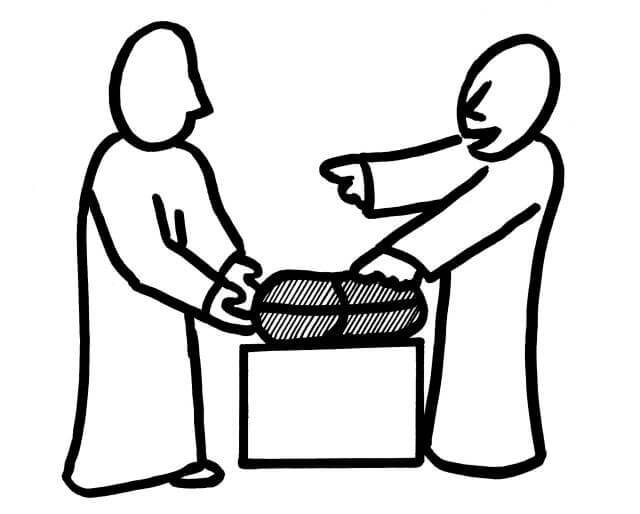ECONOMY 16 – PLEDGES

Exo 22:26 no essentials taken permanently as pledge
“If you take your neighbor’s garment in pledge, you shall return it by sun down.”
Deu 24:6 no essentials taken in pledge
“No man shall take the lower or upper millstone in pledge: for that means to take life in pledge.”
Deu 24:17 no essentials taken in pledge
“You shall not pervert the judgment of the stranger, nor of the fatherless; nor take a widow’s garment in pledge.”
- Taking a garment presumably means that there are no luxury items to take, so return it by sundown for the person to sleep in. Essentials can only temporarily be taken in pledge.
- Widow as a needy, weak, vulnerable person, often poor, is protected here.
- Absolute essentials cannot be taken in pledge. If the person is so poor, then the one giving the loan must carry the loss.
Deu 24:10 no invasive taking of pledges
“When you make your neighbor a loan of any kind, you shall not go into the house to take the pledge. 11You shall wait outside, while the person to whom you are making the loan brings the pledge out to you. 12If the person is poor, you shall not sleep in the garment given you as the pledge. 13You shall give the pledge back by sunset, so that your neighbor may sleep in the cloak and bless you; and it will be to your credit before the Lord your God. ”
- Dignity of the person in need is to be preserved, one cannot enter his house and grab something.
- Absolute essentials cannot be taken in pledge.
Num 30:1-15 if made vow or given pledge > fulfill it
“If a man vows a vow to the LORD, or swears and oath to bind himself by a pledge, he shall not break his word. He shall do according to all that proceeds out of his mouth. 3 If a woman …”
- If a person promises, makes a vow, swears or commits himself to something, that pledge must be fulfilled: Importance of faithfulness to one’s word and oral contract. See teaching unit ‘COM 02’
Unrighteous or righteous behavior described – taking of pledges
Job 22:6, 24:3, 24:9 “For you have taken a pledge from your brother without reason, and stripped the naked of their clothing … they take the widow’s ox for a pledge … They pluck the fatherless from the breast, and take pledge of the poor.”
- Job is attacked for unrighteous behavior. Job agrees that this is unrighteous, but says he didn’t behave like that.
Eze 18:7, 12, 16, 33:15 “He who does not oppress any, but restores to the debtor his pledge.”
Amos 2:8 “And they lay down upon clothes taken in pledge by every altar.”
- God accuses Israel of lawless behavior > pledge taking of essentials while behaving religiously.
Surety and pledges
Prv 6:1-5, 11:15, 17:18 Do not give surety! Do not give pledge!
- Warning to not financially involve myself by giving surety or pledging.
Prv 20:16, 27:13 If somebody gives surety > take pledges
“Take a man’s garment when he has put up security for a stranger, and hold it in pledge when he puts up security for foreigners … Take a man’s garment when he has put up security for a stranger, and hold it in pledge when he puts up security for a foreigner.“
- Taking pledges with intention of pressuring an unwise person, making him feel the consequences of his choices > warning and scaring him not to do this again.
Summary
- Pledges may be taken, the creditor has a certain right to the possessions of the debtor.
- Pledges should only be taken if needed, not to harass or show power.
- Pledges of life-essentials (millstone, cloak at night) or things essential to work oneself out of debt (ox) is forbidden.
- Pledges are only okay if they are essential to the giver, but wrong in all other cases, like to harass, show power, push into further debt.
- The goal must be to help a debtor out of debt, not to push him into further debt.
- Pledges may be taken, but the dignity of the debtor needs to be guarded. He gets to decide what item is given in pledge, the giver has no right to enter the house, to destroy private sphere or to demand.
Different types of pledging
- Taking pledges off a person who is not paying up loan or who is behind schedule with paybacks: only non-essential items can be taken, essential items only very temporarily
- pledges can be taken in the case of a loan to ensure or motivate payback (the item may have no objective value, but something of great value for the person giving it).
- Gen 43:9 Example of Judah being surety for Benjamin …”of my hand you shall require him: if I bring him not back to you, and set him before you, then let me bear the blame forever.”
- Pledging one’s field (given to the other person against money loaned) with right of redemption (Lev 25:23-28).